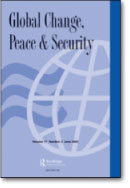Homegrown Terrorism and Transformative Learning

An Interdisciplinary Approach to Understanding Radicalization
Autor(en): Alexandre Wilner, Claire-Jehanne Dubouloz
Journaltitel: Global Change, Peace & Security
Reviewed:
Band: 22
Ausgabe: 1
Seiten: 33-51
Verlag(e): Routledge
Publikationsjahr: 2010
